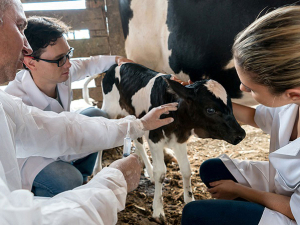Vets: trusted but misunderstood, according to survey
Around 97% of New Zealand pet owners value the care provided by their vet teams, but the broader contribution of animal health professionals to society often goes unseen, a new study has revealed.
 The event shared the findings from a comprehensive survey of the sector conducted by Boehringer Ingelheim in collaboration with NZVA and NZVNA.
The event shared the findings from a comprehensive survey of the sector conducted by Boehringer Ingelheim in collaboration with NZVA and NZVNA.
The animal health sector needs to change to keep up with the times, according to the discussion at a breakfast event hosted by Boehringer Ingelheim at the NZ Vet Association and NZ Veterinary Nursing Association conference in Christchurch recently.
The event shared the findings from a comprehensive survey of the sector conducted by Boehringer Ingelheim in collaboration with NZVA and NZVNA. The survey covered perceptions from more than 600 people in the sector including vet nurses, veterinarians, clinic management and others.
At the breakfast event, Paul Fitzpatrick, Head of Animal Health New Zealand, Boehringer Ingelheim, hosted panellists Kevin Bryant, NZVA chief executive, Laura Harvey, NZVNA president, and Nick Cooper, Carevets chief executive, for a wide-ranging discussion. The panellists discussed the importance of ensuring that great staff stay in the industry, the opportunity for ongoing training, how to build better public understanding of the sector’s work, and the difference between the experiences of vets and vet nurses.
Fitzpatrick said the survey results demonstrated the need for this conversation, and more like it.
“These responses really underscored how much work we must do. For example, 70% of respondents felt that their role and the role of the broader veterinary sector is not well understood and appreciated by the public, which shows that shifting perceptions needs to be a priority.”
Bryant says that it’s critical to tackle these opportunities together.
“The challenges the industry is facing are not new. A lot of good work is happening, but we need to increase the pace of change to ensure that our sector can thrive in the future. The kind of change we’re talking about requires collaboration across the industry, no matter your role or location.”
Harvey challenged the industry to support vet nurses better.
“Vet nurses are highly trained professionals, and yet they struggle more than others in the industry to get recognition and support. Things have been improving over recent years for our members, but our sector can’t succeed unless it is properly supporting everyone who is a part of it. For vet nurses that means ensuring proper remuneration, career progression and support in the workplace.”
Cooper says NZ can be a leader in this industry.
“We’re a nation of animal lovers, so the potential for us to build a great, respected veterinary industry is huge. We’ve been making good progress already, and we need to work together to go out and seize that opportunity.”
Following the discussion, Boehringer Ingelheim will be working with the industry to build out further resources and support for New Zealand veterinary professionals in the coming months.
Fitzpatrick added that it’s a critical priority for the company.
“In our fiftieth year in New Zealand, we’re absolutely committed to supporting this sector to grow and thrive in the future. We’re thrilled at how well the industry has engaged with this work so far and look forward to building on it into the future.”
Global trade has been thrown into another bout of uncertainty following the overnight ruling by US Supreme Court, striking down President Donald Trump's decision to impose additional tariffs on trading partners.
Controls on the movement of fruit and vegetables in the Auckland suburb of Mt Roskill have been lifted.
Fonterra farmer shareholders and unit holders are in line for another payment in April.
Farmers are being encouraged to take a closer look at the refrigerants running inside their on-farm systems, as international and domestic pressure continues to build on high global warming potential (GWP) 400-series refrigerants.
As expected, Fonterra has lifted its 2025-26 forecast farmgate milk price mid-point to $9.50/kgMS.
Bovonic says a return on investment study has found its automated mastitis detection technology, QuadSense, is delivering financial, labour, and animal-health benefits on New Zealand dairy farms worth an estimated $29,547 per season.

OPINION: Here w go: the election date is set for November 7 and the politicians are out of the gate…
OPINION: ECan data was released a few days ago showing Canterbury farmers have made “giant strides on environmental performance”.